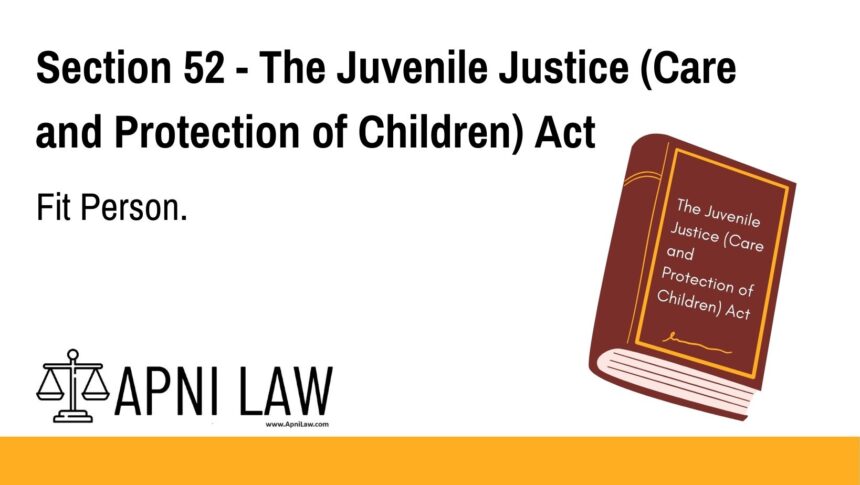Code: Section 52 – Fit Person
(1) The Board or the Committee shall, after due verification of credentials, recognise any person fit to temporarily receive a child for care, protection and treatment of such child for a specified period and in the manner as may be prescribed.
(2) The Board or Committee, as the case may be, may withdraw the recognition granted under sub-section (1) for reasons to be recorded in writing.
Explanation of Section 52 of the Juvenile Justice Act
Section 52 of the Juvenile Justice (Care and Protection of Children) Act, 2015 explains how individuals can become temporary caregivers. The law allows the Juvenile Justice Board or the Child Welfare Committee to recognise a person as “fit” to care for a child.
This recognition depends on a thorough check of the person’s background, lifestyle, and caregiving ability. Unlike a Fit Facility, a Fit Person refers to an individual, not an organisation.
The law also gives the authority power to withdraw this recognition. If the individual fails to follow the rules or poses a risk to the child, the board can revoke the recognition and record the reasons.
Key Highlights:
- A Fit Person is someone trusted to provide short-term care for a child in need.
- The person must pass a background check and meet certain caregiving standards.
- Recognition is valid for a specific period and purpose.
- If issues arise, the board can cancel the recognition with a written explanation.
Illustration
Example 1: Appointment of a Fit Person
A 40-year-old social worker applies to care for a child rescued from a harmful situation. The Child Welfare Committee checks her records, living conditions, and caregiving experience. After finding her suitable, the Committee recognises her as a Fit Person for three months.
Example 2: Revoking Recognition
Later, a complaint arises about the same caregiver not meeting hygiene standards. The Committee inspects the situation, finds the issue valid, and cancels her status as a Fit Person. This protects the child from further harm.
Common Questions and Answers
1. What does “Fit Person” mean under the Juvenile Justice Act?
It refers to a person who has been approved to temporarily take care of a child. This person must be responsible and capable of providing safety, care, and treatment.
2. Who decides if someone can be a Fit Person?
The Juvenile Justice Board or Child Welfare Committee checks the person’s background and caregiving ability before granting recognition.
3. Can this recognition be taken away?
Yes. If the person violates any rules or poses a risk to the child’s well-being, the Board can cancel the recognition in writing.
4. Is a Fit Person the same as a foster parent?
Not exactly. A Fit Person is usually appointed for a shorter, specific purpose. Foster care can be a longer-term arrangement.
Conclusion
Section 52 of the Juvenile Justice Act helps place children in safe, temporary care. It ensures that individuals who take in children are responsible and trustworthy. This section also gives authorities the power to act quickly if a child’s safety is at risk.
By providing legal checks and flexibility, the law protects children while offering them a supportive environment during times of crisis.
🔗 For more legal guides, visit ApniLaw








